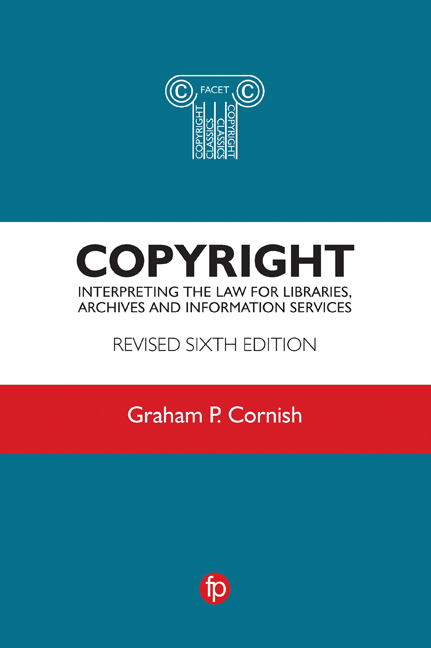Book contents
- Frontmatter
- Contents
- Author's note
- Acknowledgements
- List of abbreviations
- Introduction
- Section 1 Definition and law
- Section 2 What is covered by copyright?
- Section 3 Rights and limitations
- Section 4 Literary, dramatic and musical works
- Section 5 Artistic works
- Section 6 Sound recordings and performers’ rights
- Section 7 Films and videos
- Section 8 Broadcasts
- Section 9 Databases
- Section 10 Licensing schemes and licences
- Section 11 Computer programs, the electronic world and websites
- Section 12 Other matters
- Useful Addresses and Contacts
- Useful Sources of Information
- Appendix: suggested declaration forms
- Index
Section 11 - Computer programs, the electronic world and websites
Published online by Cambridge University Press: 19 November 2019
- Frontmatter
- Contents
- Author's note
- Acknowledgements
- List of abbreviations
- Introduction
- Section 1 Definition and law
- Section 2 What is covered by copyright?
- Section 3 Rights and limitations
- Section 4 Literary, dramatic and musical works
- Section 5 Artistic works
- Section 6 Sound recordings and performers’ rights
- Section 7 Films and videos
- Section 8 Broadcasts
- Section 9 Databases
- Section 10 Licensing schemes and licences
- Section 11 Computer programs, the electronic world and websites
- Section 12 Other matters
- Useful Addresses and Contacts
- Useful Sources of Information
- Appendix: suggested declaration forms
- Index
Summary
What is the difference between electronic material and databases?
It is very important to distinguish between electronic material and databases. One is the format in which a work is stored or transmitted; the other is a form of a work itself. There are many works which are electronic but not databases and equally many databases that are not electronic! This chapter tries to deal with some of these questions but users of this book should realise that this is a constantly changing situation and the subject matter, questions and answers are all moving targets. Because the term ‘electronic materials’ can cover works in electronic form, computer programs and databases these items will be dealt with separately within the usual headings in this chapter, although they are all linked together in some respects.
Is copyright very different for electronic materials?
The answers to many copyright questions that arise in the electronic world are exactly the same as those to the questions that arise in the more traditional paperbased world. However, some issues are peculiar to electronic materials and some of the answers which are clear in the paper world are not so obvious when we deal with electronic materials. Many of the exceptions described in other chapters are exceptions to copyright; database right is completely separate and these exceptions do not apply to databases unless they are (rarely) copyright works.
Computer programs
Are computer programs a separate sort of work?
In some ways but not in others. Although computer programs are classed as literary works, some special conditions apply. They are literary works because the definition of a literary work is that it is ‘written, spoken or sung and recorded in some notation or code’. Computer programs are a series of 0s and 1s, so this is a code which is recorded.
What about computer programs which have been printed out?
These are literary works. See Section 4.
A lot of work goes into preparing the design of a computer program. Is that protected as well?
The preparatory work would in any case be considered as a literary work, and the law specifies that this type of work is protected.
- Type
- Chapter
- Information
- CopyrightInterpreting the law for libraries, archives and information services, pp. 157 - 174Publisher: FacetPrint publication year: 2019



